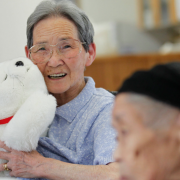OAP’s need lovin’ too!
Valentien’s Day 2020 has been and gone, but did you ever think about intimacy for the older generation of Britain? The over 60’s. According to a recent study, the over 60’s, the OAP’s, due to health problems are often left frustrated.
There’s a list of problems that prevent some OAP’s making love. Such as Trouble with joints (17%), being too tired (22%) and erectile dysfunction (22%). This according to a survey of 2,000 over-55s conducted for health supplement company FutureYou Cambridge.
3/4 if those surveyed said that their love lives can also be affected by age related issues. Such as creaky knees and arthritis. While 2/3 of people heading towards retirement say that they’re still sexually active now and then but aren’t able to get jiggy with it as much as they want to.
While the study of over 1,000 people over 55 with arthritis, also found that 1/4 of Britains 10M arthritis sufferers said they too have less sex than they used to.
Furthermore over half (57%) of OAP’s say they exercise less, 54% say that it affects their sleep and over a quarter (28%) socialise less. Nearly half (46%) say that it has a negative impact on relationships and 26% are having less sex.
Taking action
Sex therapist Kate Taylor says:
“Intimacy is really important. Regular sex gives your physical health a giant boost. Regular lovemaking lowers stress, strengthens your immune system, builds muscle strength, and has even been shown to improve memory!”
The survey discovered that 20% were seeking medication.
According to the research by FutureYoU Cambridge, 12% avoid taking medication. Such as painkillers as they’re afraid of the side effects and addiction. Furthermore nearly half say they look to avoid taking over the counter pain relief. 27% of those surveyed say they have not found medication that works for them.
47% of OAP’s are open to trying other remedies such as food based or herbal based remedies. While 23% have considered using tumeric. Despite significant research demonstrating evidence of its anti-inflammatory properties.
What is tumeric?
Whilst Turmeric is fantastic it is just one of a number of great natural pain relievers.
Turmeric is a plant that has been used for centuries in cooking and traditional medicine. It’s known to contain a powerful active ingredient, of curcumin. Which has many anti-inflammatory properties.
Inflammation is one of the symptoms of arthritis. FutureYou Cambridge have patented and created a supplement. It’s called Tumeric+. Tumeric+ is 30x more absorbable than standard tumeric. Due to the curcumin being combined with soy lecithin and also incorporates other micronutrients ingredients.
Pain expert Dr Nicholas Shenker, consultant rheumatologist at Addenbrooke’s Hospital, said:
“Curcumin is poorly absorbed in the gut. FutureYou Turmeric+ combines curcumin with lecithin to prevent it being destroyed in the stomach. This allows it to be absorbed and distributed around the body and could help those suffering with arthritis.’
For more information on the health benefits of turmeric, click here!
Keep up to date with everything How To Kill An Hour by signing up to our newsletter by clicking here!
Let us know what you think of the show by clicking here!
Click here to subscribe to our YouTube Channel to see more amazing ways to kill time!
Follow us on Twitch by clicking here!


